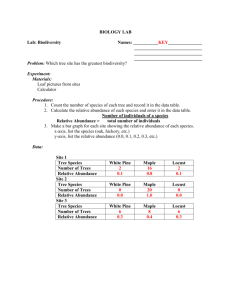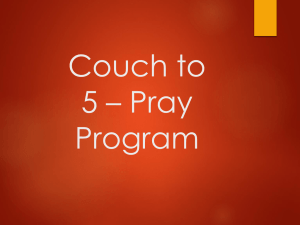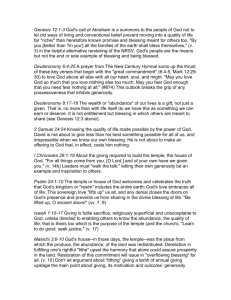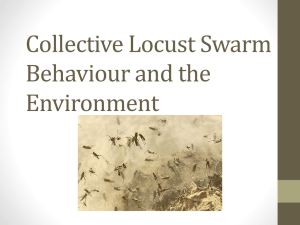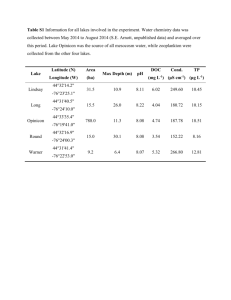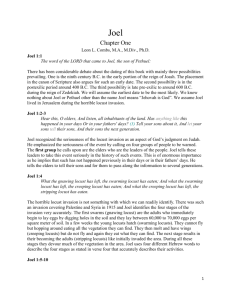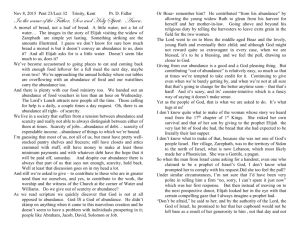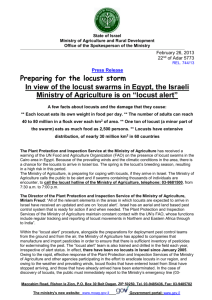File
advertisement
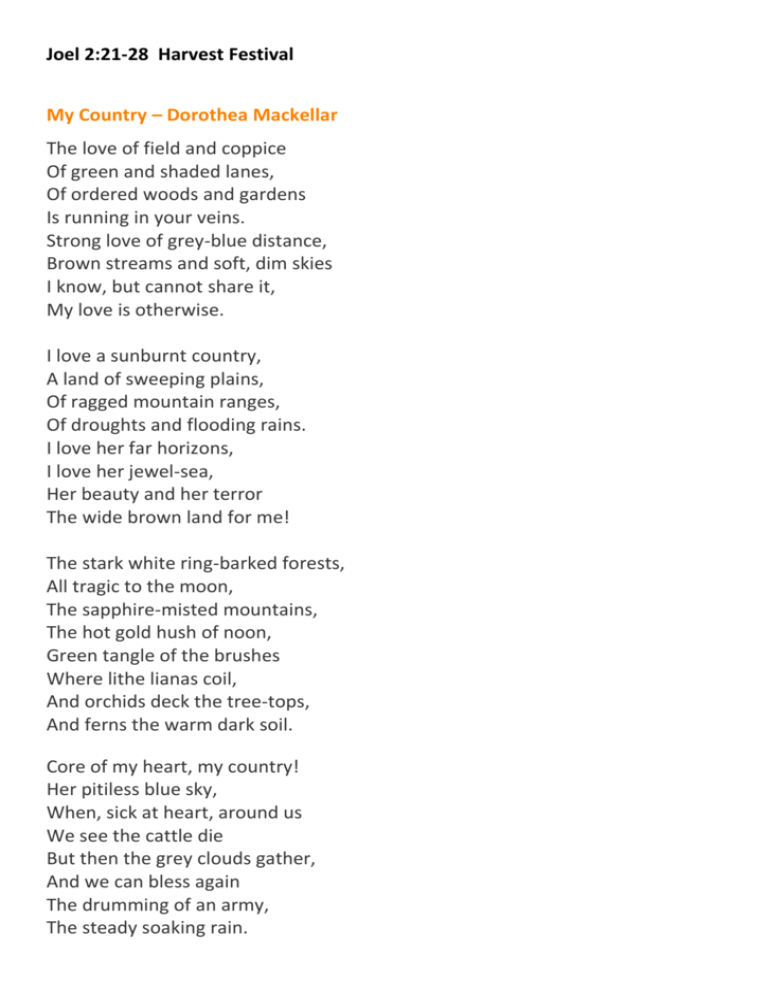
Joel 2:21-28 Harvest Festival My Country – Dorothea Mackellar The love of field and coppice Of green and shaded lanes, Of ordered woods and gardens Is running in your veins. Strong love of grey-blue distance, Brown streams and soft, dim skies I know, but cannot share it, My love is otherwise. I love a sunburnt country, A land of sweeping plains, Of ragged mountain ranges, Of droughts and flooding rains. I love her far horizons, I love her jewel-sea, Her beauty and her terror The wide brown land for me! The stark white ring-barked forests, All tragic to the moon, The sapphire-misted mountains, The hot gold hush of noon, Green tangle of the brushes Where lithe lianas coil, And orchids deck the tree-tops, And ferns the warm dark soil. Core of my heart, my country! Her pitiless blue sky, When, sick at heart, around us We see the cattle die But then the grey clouds gather, And we can bless again The drumming of an army, The steady soaking rain. Core of my heart, my country! Land of the rainbow gold, For flood and fire and famine She pays us back threefold. Over the thirsty paddocks, Watch, after many days, The filmy veil of greenness That thickens as we gaze ... An opal-hearted country, A wilful, lavish land All you who have not loved her, You will not understand though Earth holds many splendours, Wherever I may die, I know to what brown country My homing thoughts will fly. You’ll all be familiar with that poem. (Who wrote it?) It’s always been one of my favourite poems, because I really resonate with how she has captured the absolute essence of Australia. The fourth verse, where Mackellar speaks of the cattle dying, and then the drumming of the rain, I see very much reflected in today’s reading from the Old Testament. Through the prophet Joel, God was speaking to the Jewish nation of Judah. They’d been doing it tough, as they had been devastated by a severe drought and a massive locust plague. It’s hard to imagine how the people survived. I have a friend in Mildura who described the locust plague they had out there some years ago. She couldn’t believe how quickly the locusts decimated every living plant. The crops, gardens, trees – all completely devoured. Joel saw the devastation of the land as a harbinger or sign, if you like, of a day to come when God would bring all things to a close; when the wicked would receive their just desserts, and those who were faithful to God would be blessed and restored. The New Testament also talks of this day. It has various names – “the Day of the Lord” or the return of Jesus, or more colloquially, Judgement Day. It’s the day when all that is wrong and evil is vanquished, when all that is sick and broken is healed, and when those who love and serve God are invited to live with him in a NEW creation – one that is rich and abundant. Joel calls on the people to change their ways; to stop ignoring God, and to return to him, and serve him. The call is the same in the New Testament. We need to come before God and ask his forgiveness for living our lives without any reference to him, and to turn back to him and serve him. Then he says, they can expect God’s blessing. He says this to them: “Be not afraid, O land; be glad and rejoice. Surely the Lord has done great things. Be not afraid, O wild animals, for the open pastures are becoming green. The trees are bearing their fruit; the fig tree and the vine yield their riches. Be glad, O people of Zion, rejoice in the LORD your God, for he has given you the autumn rains in righteousness. He sends you abundant showers, both autumn and spring rains, as before. The threshing floors will be filled with grain; the vats will overflow with new wine and oil. "I will repay you for the years the locusts have eaten— the great locust and the young locust, the other locusts and the locust swarm— my great army that I sent among you. You will have plenty to eat, until you are full, and you will praise the name of the LORD your God, who has worked wonders for you; never again will my people be shamed.” God promises a time will come when all will be set to rights. A time when will be an end to the drought and famine. There will be plenty to eat and life will be full of abundance and blessing. That sounds good, doesn’t it? For those of us who believe the Scriptures, this is a reality we look forward to. But it is conditional. It is conditional upon us returning to God. It is conditional upon us recognising that Jesus Christ died on the cross to deal with the mess we have made of this world, and to deal with our own sin. It’s conditional upon us giving Jesus his rightful place in our lives as our Lord. Christians believe that Jesus will return, and that all that is broken and hurting will be healed and set to rights. In place of sorrow and tears, there will be abundance and blessing. God promises it for those who love him. Meanwhile, we live on this fractured earth and must deal with its extremes and its imbalances. And so it is that countries like East Africa are experiencing drought and famine, while other parts of the world have so much that they throw away enough food to feed entire nations. Part of our calling while we inhabit this earth, is to be agents of God’s blessing to those who are in need. Those who have an abundance are called to share their abundance with those who have little or nothing. Those who are rich are called to share their wealth with those who are poor. Those who are healthy are called to help those who are ill. There is enough produce on the earth to feed the entire planet. Sadly though, 20% of the people consume 80% of the resources. This injustice is something we need to address – not only for the sake of the poor, but for the sake of the planet as well. A harvest festival is a joyous occasion. As we rejoice in the abundance of God’s provision poured out upon us, we are given a glimpse of the abundance and blessing that will characterise his Kingdom. As we give thanks for all that he has given us, we recognise his love for us, and as we rise to the challenge of sharing our abundance with those who do not have what we have, we are reflecting something of the character of God himself. Our two churches are doing what we can to rise to that particular challenge. There is the Drop in Centre & Monty’s Place. There is ministry to the frail and aged in our community, and a refugee family that has come under our wing at no 9 Tilba St. There is also much that we all do as individuals as we give and as we serve – but we need to be alert to the ongoing prompting of the Spirit of God as he continues to guide us to make a difference in our broken and hurting world. I pray that today we will indeed be thankful for all that God has blessed us with – and not just for produce – but all his blessings to us: we can give thanks that we live in a peaceful and prosperous nation; thanks that we have rooves over our heads, sanitation, power and running water; thanks that we have enough to eat; thanks that we have families and friends. And I pray that today, we would be mindful of those who live on the other end of the spectrum. May we be moved to not just be generous today, but to continue to live in a spirit of generosity which can change our world. Let’s pray.

